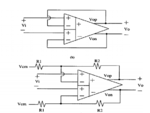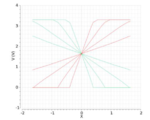Junus2012
Advanced Member level 5

Hello,
In all the references I read in simulation or measuring the fully differential ampliifer, the setup is set so that input common mode voltage is equal to the output comon mode voltage which set by the value of VCM. For example if I am using single supply operation VDD = 3.3 and VCM is set to the middle = 1.65 V, then I always apply input differential signals for purpose of simulation which are symetrical around 1.65 V,,, Once I tried to change it and the ampliifer fail
I am looking forward for your discussion
Thank you very much
Regards
In all the references I read in simulation or measuring the fully differential ampliifer, the setup is set so that input common mode voltage is equal to the output comon mode voltage which set by the value of VCM. For example if I am using single supply operation VDD = 3.3 and VCM is set to the middle = 1.65 V, then I always apply input differential signals for purpose of simulation which are symetrical around 1.65 V,,, Once I tried to change it and the ampliifer fail
I am looking forward for your discussion
Thank you very much
Regards





